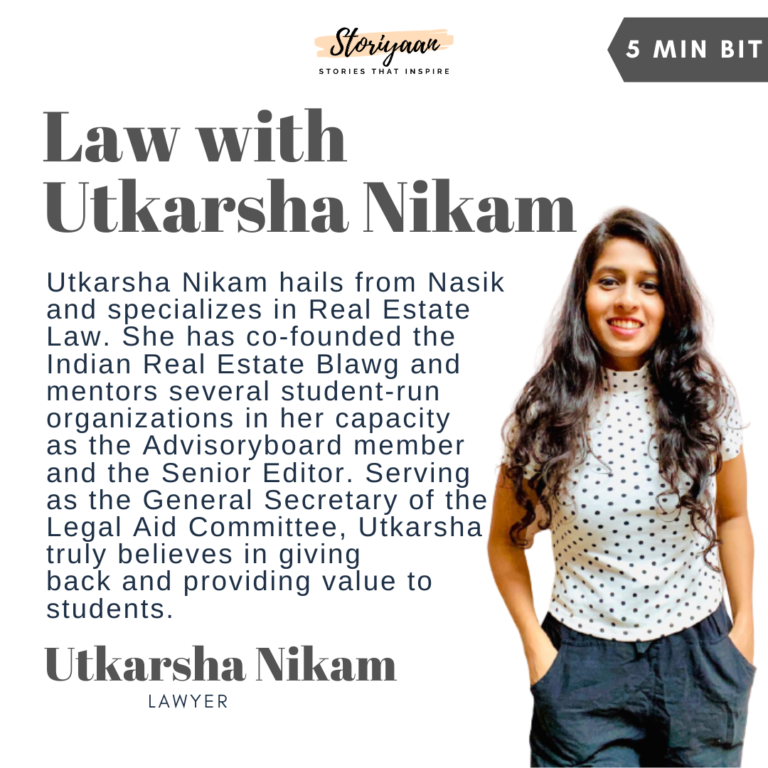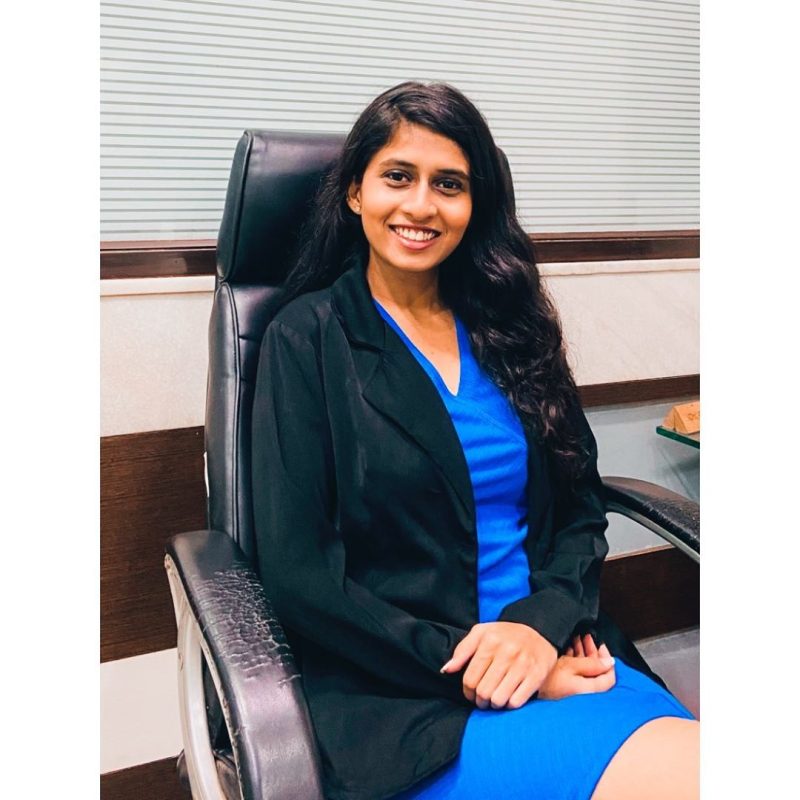Utkarsha Nikam hails from Nasik and specializes in Real Estate Law. She has co-founded the Indian Real Estate Blawg and mentors several student-run organizations in her capacity as the Advisory board member and the Senior Editor. Serving as the General Secretary of the Legal Aid Committee, Utkarsha truly believes in giving back and providing value to students.
Learn what the young lawyer has got to say about the law, IRB, and reading relevance.

Interview
Questions and answers
Tell us about your journey in a few words.
I’m someone who has no family background in the field of law. So, when I was thinking of taking up law, I was very unsure of the opportunities that might come across. Joining Government Law College, has helped me to understand the opportunities in the field of law.
When talking about the professional journey, I practice law with a top premium law firm in India. I have developed a deep domain in the property due diligence, and the property dispute matters. By far, the journey has helped me grow as an individual and develop my interest in the field of law.
Can you tell us about IRB, and what is it for?
In law school, what happens is that you are not taught the practical aspects of the law. I learned many of the terms and things used professionally in law school, but even the layman should be aware of certain words they usually do not understand. I wanted to bridge the gap between practical and theoretical law. I started with this platform called IRB, which is the Indian Real Estate Blawg. It helps to demystify the law in a simple language so that the legal professionals and the law students can use them. It helps me personally and professionally because I think I’m well more prepared, and my writing skills are improvised a bit more.
What is the criterion, should students follow who wish to take up law as a profession?
I would say that anyone interested in taking up law as a profession should start reading about law as an option from a very early age, so they understand the opportunities offered in law. Also, be thorough with the requirement; for example, when I was in law school, I immersed myself in these extracurricular activities such as debates, which gives you a glimpse into law. So, I think people should start reading about the law in general because I think that law is something which is the primary medium in every piece of work. You cannot proceed without it because you have a lot of compliances to follow.
How did law happen to you? Did you always want to be a lawyer?
From a very early age, my parents dreamed that I should be a lawyer. We watched these different shows where my parents told me their legal points, which I did not use to understand or know the implications. But, I have been around that environment since a very early age, and my parents are doctors, so I think taking up law as a profession was like breaking the barrier. I had to go out of the conventional way, and I think coming this far confirms that yes, the law is the field for me. I think by the time I passed out from GLC, I was very convinced that this is the profession, and it will help me towards my goal at the end of the day.
You mentor several student-run organizations. Tell us something about it?
I have the background of judging these competitions and being a mentor and guide for students. So they seek my advice from time to time and help them boost and move in closer to the aim because they started the organization in the end. It also helps me be in touch with different students because it is a different feeling; when you start working, you lose the connection of being a student. When you are around with these organizations, it helps you stay connected with the legal professionals from various fields and be in touch with the students.
What challenges do you face being in the law profession?
I believe law is a profession in which hard work is the key ingredient that will determine if you succeed or not. It requires a lot of time and attention and a lot of focus because you have to stay updated as the laws are continually changing in recent times. So it is tough to cope up and understand what is happening. Sometimes it is nice to be in one profession, and I’m still trying to understand, and it is something I’m trying hard to adjust to cope with the changing faces of law during this time. So yeah, I think I would mention that because I’m not able to do that.
You have bagged the recognition of GLC and co-founded IRB. How do you feel coming so far in your life?
It has been a fantastic journey so far as if you had known me through my college and high school years, I was a different and shy, introvert person, but I think shifting to GLC is an extra push that I needed in my life.
Concerning IRB, I feel that it has given me a different kind of recognition and has included me in real estate and helped me bridge the gap or understand the legal concept. Many people face the same ideas, and like I think in a way, it had helped many people when I was trying to help myself, which I started for my knowledge, but then a lot of people connected through it that way. So yes, GLC and IRB have helped me to be the person I am today.
A piece of advice you would like to give to the budding law students.
One important advice which my senior had given was to read. When I was a law student, I didn’t realize its importance, but now that I have started preaching that into practice, I understood because I think readers are leaders at the end of the day. The more you read, the more you will succeed and learn. My dad has always told me that you ever invest yourself in learning and not expect the fruits out of it. That will eventually come, so you have to make sure that you have to invest in learning your life’s initial raw years.

